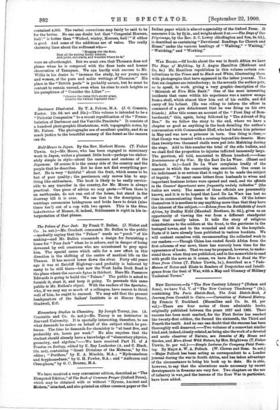WAR Booxs.—Of books about the war in South Africa we
have The Siege of Mafeking, by J. Angus Hamilton (Methuen and Co, 6s.) Mr. Hamilton republishes in this volume certain con- tributions to the Times and to Black and White, illustrating them
with photographs that have appeared in the latter journal. The first six chapters are introductory; in the seventh the author gets, so to speak, to work, giving a very graphic description of the "Skirmish at Five Mile Bank." One of the most interesting incidents that came within his experience was a narrow escape from a shell, which almost blew him out of his saddle, and did carry off his helmet. (He was riding to inform the officer in
command of a gun detachment that he was firing on his own friends.) After this comes an account of the "First Day of Bom- bardment," this, again, being followed by "The Advent of Big Ben." So we follow the story to the end, where we have a chapter as good as anything in the book detailing the author's conversation with Commandant Eloff, who had taken him prisoner in May and was now a prisoner in turn. One thing is clear,— that Cronje was treated with a courtesy beyond his deserts. More than twenty-two thousand shells were put into Mafeking during the siege. Add to this number the total of the rifle bullets, and we shall find the proportion to injuries inflicted immensely large. The garrison, all told, amounted to fifteen hundred.—Some Reminiscences of the War. By the Earl De La Warr. (Hurst and Blackett. ls.)—Lord De La Warr complains loudly of the manner in which the censorship was exercised. One count in his indictment is so serious that it ought to be made the subject of inquiry. "In many cases letters from husbands to wives and important business letters were opened and read, and the officials in the Censors' department were frequently unduly talkative" (the italics are ours). The names of these officials are presumably known, and it is to be hoped that Lord De La Warr has lost no time in communicating them to the authorities. Of the letters themselves it is needless to say anything more than that they have the interest of the subject.—Echoes from the Battlefields of South Africa, by Dudley Kidd (Marshall Brothers, 2s. 6d.), gives us an opportunity of viewing the war from a different standpoint than that usually taken. It tells the story of religious ministrations to the soldiers at the front, to the garrisons in the besieged towns, and to the wounded and sick in the hospitals. Parts of it have already been published in various booklets. We will content ourselves with recommending the collected work to our readers.—Though China has ousted South Africa from the first columns of war news, there has scarcely been time for the appearance of books. That we may be prepared, however, to under- stand them when they are published, and in the meanwhile to read with profit the news as it comes, we have How to Read the War News from China (T. Fisher Unwin, is.), described as a " Vade- Mecum of Notes and Hints to Readers of Despatches and Intelli- gence from the Seat of War, with a Map and Glossary of Military Technical Terms."






































 Previous page
Previous page